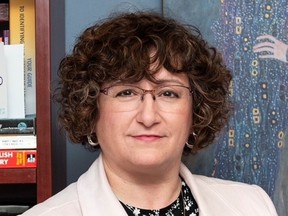“I’m not saying it’s a societal problem, but there should be a recognition of the burden that caregivers take on.”

Article content
When former CEO Bruce Wood was diagnosed with early-onset Alzheimer’s disease in 2016, he made it his goal to speak publicly about the disease to help others. When he could no longer do so, that duty fell to his wife, Lisa Raitt.
The former federal minister, lawyer and mother has made talking about her husband’s illness a part of her busy life, even when it is difficult, as it often is. She considers it her duty to help people better understand the disease and support caregivers like her.
Advertisement 2
Article content
Article content
“I always accept these invitations.”
Raitt will be the keynote speaker at a conference in Ottawa this weekend aimed at helping patients and their caregivers navigate the often complex systems of care once they are diagnosed with a neurological disease like Alzheimer’s.
The Enhancing Access to Care conference, sponsored by the Brain and Mind Research Institute at the University of Ottawa, will include sessions on barriers to access to care for rural residents, the latest research on neurodegenerative diseases, including Parkinson’s disease, and dementia, and information about the regional geriatric program. and Raitt’s talk on the challenges of early-onset Alzheimer’s care.
The conference is a recognition of the difficulties that patients and their carers may have in accessing the help they need.
Wood was diagnosed when he was 56 and Raitt was 47. It was a shock. Raitt said he wanted people to think about the fact that “sometimes it’s Alzheimer’s,” meaning that possible symptoms shouldn’t be discounted just because of a person’s age.
In the first few days after her diagnosis, Wood’s illness seemed to progress slowly, she said, and they were able to travel and “do all of our bucket list things.” But then it progressed and life became more and more difficult.
Advertisement 3
Article content
“We had a very specific set of circumstances where Bruce was becoming very combative, not just aggressive, but aggressive that threatened our lives in the house. When you’re in this, you can’t negotiate because you’re drowning and you’re just trying to keep your head up.”
Raitt said she thought it was important for people to hear the realities of the disease “because I’m not the only one who is going through this or went through this. I think I have the obligation to at least give some kind of color to reality so that others can recognize it.”
Wood is now in a nursing home, something Raitt says he fought “with every fiber.” She acknowledges that he is receiving better care than he could receive at home and that she probably waited too long to do it.
“I think what might have helped me is if someone said he would be better off in a long-term care facility because he gets better care than I could have given him.”
Raitt said he also hoped members of the medical community would hear his story to start thinking about the possibility of early-onset Alzheimer’s when a patient had symptoms that could include increasing problems with planning, problem-solving, attention and emotions.
Advertisement 4
Article content

She also noted that the vast majority of caregivers, like her, are women. Raitt, a lawyer, belonged to a support group of caregivers in similar circumstances and says almost all of them decided to retire early because of the pressures of caring on top of their job.
“I didn’t have the option to retire. I have two children in college and a husband with special needs. That requires extra money, and I also continue to work for my own sanity,” she said. “But the reality is that caregivers are the ones who take a burden off of society and society could not function without us. “I’m not saying it’s a societal problem, but there should be a recognition of the burden that caregivers take on.”
The conference, which will be held on Saturday at the RA Centre, is aimed at people with neurological conditions and their carers. In addition to the presentations, organizations will be on site to offer information about other services available in the community, including those for traditionally marginalized groups “who may not know that there are services specific to their needs,” said Dr. Lisa Walker, a neuropsychologist. clinic. who is co-director of the neurodegeneration pillar of the uOttawa Brain and Mind Research Institute.
Advertisement 5
Article content
It is the first event of its kind for the University of Ottawa’s Brain and Mind Research Institute. Typically, the events are research-oriented, Walker said.
Living with neurodegenerative diseases is difficult, she said, and it can be a daunting task to access care. Sometimes it is available, but people don’t know how to find it.
He said the shortage of family doctors was an additional burden on people to understand the supports available in the community. “There are a lot of great services that people can access, but they don’t know they exist and they can’t access them.”
These include services through the regional geriatric program and the Dementia Society of Ottawa and Renfrew County. One of the speakers will talk about Ontario 211, a helpline to help people access social services, programs and community supports.
Walker said the conference would also address the burden of informal caregivers, as family members and friends who care for loved ones are called.
“It’s a huge burden of care, both from a practical and emotional point of view.”
The conference will be held on Saturday from 9 am to 5 pm. The conference, including lunch, is free and the venue is accessible. More information available online: https://www.uottawa.ca/research-innovation/brain/events/enhancing-access-care
Article content
